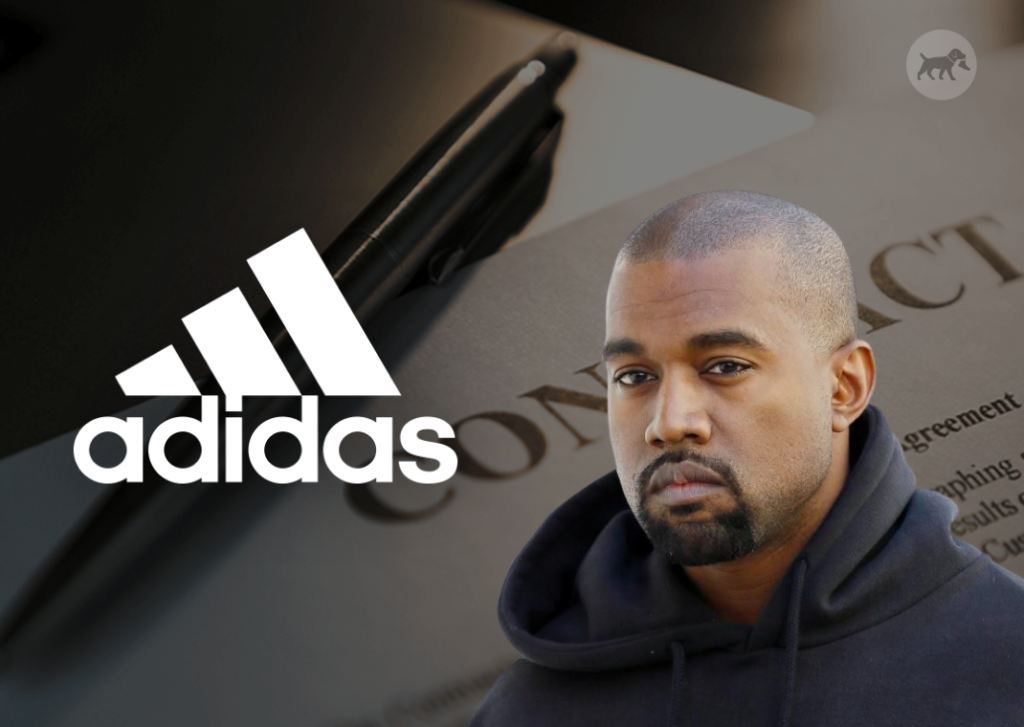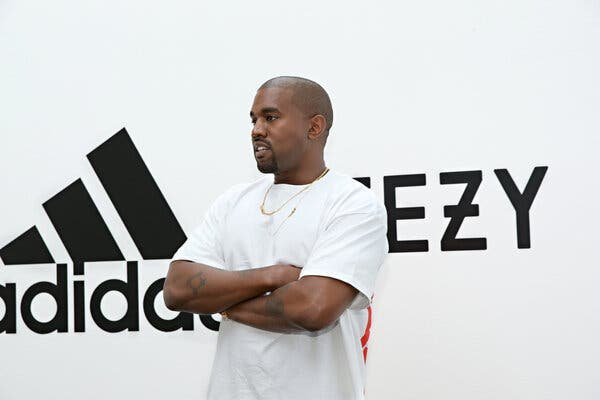The German sportswear giant is the latest company to cut ties with Mr. West, now known as Ye, after his antisemitic remarks. Ending the partnership is expected to hurt company profits.
For more than two weeks, as Kanye West made a series of antisemitic remarks and embraced a slogan associated with white supremacists, Adidas, the most important partner in his fashion empire, said only that its relationship with the rapper and designer was “under review.”
But as Ye, as Mr. West is now known, continued his offensive behavior, and with the condemnation of his remarks growing more widespread, Adidas announced Tuesday that it would cut ties with him — a move the company said would cost it 250 million euros ($246 million) this year.
The end of their nearly decade-long partnership — which one estimate said was worth close to $100 million annually to Ye — raised questions of what would come next for Ye, who has been one of the most influential pop stars of recent decades but has become increasingly polarizing and unreliable. CAA, Ye’s former talent agency, no longer represents him and Def Jam, his longtime record company, said that his contract had expired last year.
adidas does not tolerate antisemitism and any other sort of hate speech. Ye’s recent comments and actions have been unacceptable, hateful and dangerous, and they violate the company’s values of diversity and inclusion, mutual respect and fairness.
After a thorough review, the company has taken the decision to terminate the partnership with Ye immediately, end production of Yeezy branded products and stop all payments to Ye and his companies. adidas will stop the adidas Yeezy business with immediate effect.
This is expected to have a short-term negative impact of up to €250 million on the company’s net income in 2022 given the high seasonality of the fourth quarter.
adidas is the sole owner of all design rights to existing products as well as previous and new colorways under the partnership. More information will be given as part of the company’s upcoming Q3 earnings announcement on November 9, 2022.
Though Adidas was among the first of Yeezy’s corporate partners to announce publicly — on Oct. 6 — that it had placed the relationship under “review,” the fact that the company did not move faster to officially sever the ties began to take a toll. The Anti-Defamation League shot back, “What more do you need to review?”
Like many of Ye’s other fashion connections, Adidas seemed to be dragging its feet, perhaps hoping for a public apology that could turn things around. Unlike Ye’s other fashion relationships, which were largely unofficial and based on mutually advantageous appearances, untangling the deal between Yeezy and Adidas would have major contractual and long-term implications; the two brands were intertwined not just publicly, but financially and logistically as well. For Adidas, the partnership was worth more than 10 percent of the more than $2 billion it made in profit last year.
The Anti-Defamation League stepped up its pressure on Adidas this week, after members of a hate group hung a banner reading “Kanye is right about the Jews” over a Los Angeles freeway.
In Germany, the Central Council of Jews called on the company to cut ties to Ye. “The historical responsibility of Adidas lays not only in the German roots of the company, but also in its entanglement with the Nazi regime,” Josef Schuster, the head of the council, said. “I simply expect such a company to take a strict position regarding antisemitism.”

The founder of Adidas, Adi Dassler, belonged to the nazi party, and his factory was forced to produce munitions in the final years of the war. It was only thanks to the sworn statement of a Jewish friend that he was allowed to found the present-day company after World War II ended. Antisemitic statements made online can lead to prosecution in Germany, and companies with ties to the Nazi era are expected to act to prevent the return of such sentiment.
She pointed out that while Adidas had severed ties with athletes who failed drug tests, or were “difficult to work with,” it was “unwilling to denounce hate speech, the perpetuation of dangerous stereotypes and blatant racism by one of our top brand partners,” she wrote.
